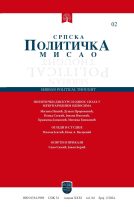- Home page
- Researchers
- Milica Kulić
Milica Kulić
Faculty of Political Science, University of Belgrade

“FAKE NEWS” OR DISINFORMATION: (SELF)REGULATORY FRAMEWORK AND CHALLENGES IN PRACTICE
“Fake news”, or disinformation, as a phenomenon and as a term is being overused lately. In parallel, there is no consensus what does this term mean neither in media theory nor in media law. In the meantime, “fake news”, especially online spread disinformation, have started to have enormous impact to electoral processes worldwide, thus creating new social and political reality. Institutional sources, political leaders and media are all being accused for dissemination of “fake news”. However, disinformation are easily spread on social networks. Oxford Internet Institute Research shows that the number of visits to “fake news” web sites was, for the first time, higher than visits to links to professional media during the US mid-term elections in November 2018. This paper aims to contribute to existing debates on attempts to clearly define the term disinformation, looking at it from the media theory, media ethics, media law and internet law points of view. The Article analyzes some of the available definitions offered by international organizations. In addition, the object of analysis is self-regulation, through various self-regulatory mechanisms, predominantly created by associations of journalists. Finally, the paper examines the new form of regulation, so called “pseudo-regulation”, in which international companies, such as Facebook, Google, Twitter or Mozzila, start to regulate themselves.
